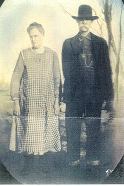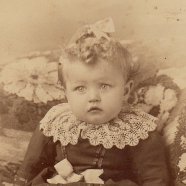Chapter One: The Story of
Ralph and Mary Carey
 Mary's
mother had passed away when she was only five years old. Seeing her
mother leave for the hospital, and hearing her say to her father and
grandmother, "please take care of the children," would always
be in her memory. Mary also remembered being lifted by her father to
kiss her mother as she lay in the coffin. This was an especially hard
time for the Goebel family, and doubly so when Bessie, the baby of nine
months, passed away soon after her mother died. Mary's
mother had passed away when she was only five years old. Seeing her
mother leave for the hospital, and hearing her say to her father and
grandmother, "please take care of the children," would always
be in her memory. Mary also remembered being lifted by her father to
kiss her mother as she lay in the coffin. This was an especially hard
time for the Goebel family, and doubly so when Bessie, the baby of nine
months, passed away soon after her mother died.
Mr. Goebel worked in a coal mine near Scranton. Sometimes it was necessary
to leave Mary and Lester who was two years younger, home alone. The
burden of housework fell all too soon on Mary. She stood on a wooden
box at the kitchen table to wash dishes in the dishpan. Sometimes she
would put the pan of water on the cook stove and then go outside to
play while it heated. After awhile she would remember, and go in to
check the water. If it was too hot, she would go out and play again
while it cooled, only to discover later it had cooled too much, and
she would have to fix the fire and heat it up again.
 Another
memory of early childhood was of having whooping cough. Some people
thought the best cure was to go down into the coal mine. Mary and Les
were placed in something (as she remembered it) like a large bucket
and let down by a rope. As they went down, down, they watched the opening
of the mine get smaller and smaller, until it seemed there was only
a speck of light. It was a very frightening experience, and didn't cure
the whooping cough either! Another
memory of early childhood was of having whooping cough. Some people
thought the best cure was to go down into the coal mine. Mary and Les
were placed in something (as she remembered it) like a large bucket
and let down by a rope. As they went down, down, they watched the opening
of the mine get smaller and smaller, until it seemed there was only
a speck of light. It was a very frightening experience, and didn't cure
the whooping cough either!
They lived near the railroad and many hobos rode trains in those days.
One day a hobo knocked on the door and Mary answered. He asked her where
her parents were. She told him Pa was working in the mine, her Ma was
dead, and no one was there but she and Les. Then she offered to fix
him a slice of bread and sugar. The hobo stared at her for what seemed
like a long time before going on down the road.
When Pa came home and Mary told him about the visitor and their conversation,
he became very concerned. Pa said, "The next time this happens,
you tell them your Ma is in the next room--and never, never tell a stranger
you and Les are here alone!"
Sometimes Mary would go to visit her grandparents, the Culbertsons.
She enjoyed playing with Mayme and Bess, who were really her aunts but
were only a few years older.
Grandpa Culbertson worked for the railroad. Their house was very nice
compared to the one her father owned. Mary was awed by the fact that
Grandma always used white linen tablecloths every day, even though she
did the laundry with a tub and washboard. During the course of a meal,
Mary knew that she must not ask to be excused for any reason. If this
was absolutely necessary, she was not allowed to come back to finish
eating.
One day while she was visiting her grandparents, her grandpa came home
from a business trip, bringing Mayme and Bess each a bracelet made of
sea shells fastened to a gold wire. Mary thought these bracelets were
the most beautiful she had ever seen, and Oh, how she wanted one too.
It wasn't long before her grandpa came home one night, called her, and
asked her to put her hands behind her back, close her eyes and stand
very still. While she stood there, she felt him fasten something onto
her wrist. That's right! It was a bracelet exactly like Mayme's and
Bess'! Mary was so happy. She felt so dressed up when she wore it. She
treasured the bracelet and kept it all her life. She enjoyed showing
it to her daughters and telling them the story of that day when Grandpa
Culbertson made her a very happy little girl.
When Mary was seven years old, her father and his brother, Uncle John,
decided to go to the Oklahoma panhandle to see about homesteading some
land. They planned to make the trip in a covered wagon It was decided
that Les could go along, but such a trip was no place for a little girl,
so Pa made arrangements for Mary to live with Mrs. Anderson. Mr. Goebel
thought this to be a very wise decision, since Granny Anderson, as she
was called, was believed to be a very kind, religious person.
Mary was terrified at the thought of being left behind, and sobbed and
sobbed as the covered wagon disappeared in the distance. She really
had been left behind with Granny Anderson.
This was the beginning of what proved to be a nightmare for Mary. She
slept on a trundle bed which was made up during the day and pushed under
the big bed where Granny slept. Her bed was, therefore, very low. One
night, she awakened to see a man's face peering into the window by her
bed. She began to scream, this awakened Granny who was furious because
she could see no one. Of course the man had enough time to run away.
Granny had a razor strap which she kept to use as punishment, and so
gave Mary a hard beating for waking her. The "peeping-tom"
was later discovered to be a friend of Granny's son. He had come by
for a night of drinking and card playing.
The old woman taught Mary a prayer to say each night before going to
bed. One night, Mary forgot and playfully jumped into bed. This was
another time the strap came into use. During the night, Granny used
a round, flat wash pan for her "chamber pot". It was placed
on a chair and was usually filled to the brim by morning. Each day,
one of Mary's duties was to carry this "pot" through the house
and empty it into an outside toilet. If one drop was spilled--out came
the strap again. How Mary dreaded this daily chore.
During this time, Mary developed a large carbuncle on her back, near
her shoulder blade. Granny refused to treat it or help in any way. One
day, Aunt Bess came to see how Mary was getting along with Granny. Mary
was so glad to see her! While they were visiting, Mary mentioned the
carbuncle and how much it pained her. Aunt Bess decided she must see
about this. When she saw her niece's back--not only the terrible looking
carbuncle, but also the many bruises and cuts caused by the razor strap--she
said, "Let's pack up your things, Mary. You're going home with
me!"
How happy and relieved Mary was to get away from Granny Anderson and
to be with Grandma and Grandpa Culbertson, Bess and Mayme. she stayed
with them until her father and Les came back to Kansas.
Granny's so-called religion made a deep impression on the child she
mistreated. It was hard for Mary to take seriously anyone who spoke
to her of God and His love. It was many years later, when she was in
her seventies, that she was willing to accept Jesus Christ as her Savior.
This happened in her home at the invitation of a visiting minister.
Mary and her brother Les attended the Fritzlen School. Some of her memories
were of the fun of "spell-downs", and of the rush to drink
from the community pail and dipper before the boy with the continually
running nose took his turn.
(Click here for *large* image
of Fritzlen School 1905-1906 year book, provided by cousin Richard
Gossett)
She remembered her long braids, so long she could sit on them. She was
unable to comb and braid her hair herself, so she would hurry and stop
at her Aunt Mary's on her way to school. If Aunt Mary had time, (after
helping her own five daughters get ready), she would fix Mary's hair
and help her look more presentable. This became quite a bother, and
one day in desperation, her father took the scissors and while her hair
was still braided, cut the braids off just below her ears. After that,
it was much easier for Mary to care for her own hair. Ralph attended
this school at the time and said later he first noticed Mary because
of her beautiful braids--before Pa cut them off.
Sometimes relatives--uncles or boy cousins--would come to live with
them. This only made more work for Mary. How she struggled with the
laundry! Those heavy suits of long underwear were impossible to lift
and scrub on the wash board once they were wet, and harder yet to wring
by hand. One uncle became very angry because the clothes didn't come
off the line as clean as he thought they should have. He threw them
at Mary in disgust.
Many times Mary spent the night with her cousins at Aunt Mary and Uncle
Bill Goebel's home. What fun they had! All six girls would get into
the same bed, lying crosswise, and after talking and giggling for hours
they would finally go to sleep.
Pa was a fiddler and when Les was old enough to understand the workings
of a fiddle, his father taught him how to play. They were a popular
team and played for many square dances. These were usually held in someone's
home. They would play many hours and sometimes were paid twenty-five
cents for their night's work.
The young people of the community enjoyed the dances and would walk
many miles to attend. Many were held at the home of Ralph's parents,
Ed and Libby Carey. This home consisted of two rooms. Libby allowed
Ralph and his brothers to move the furniture into one room, leaving
the other vacant for dancing.
Sometimes Pa played a bass fiddle. He would carry this wrapped in a
blanket under his arm. People teased him and called the fiddle his "wife".
Mary used to wonder if life would have been easier for her had Pa married
again. He never seemed interested, even though he lost his wife when
he was still young.

|